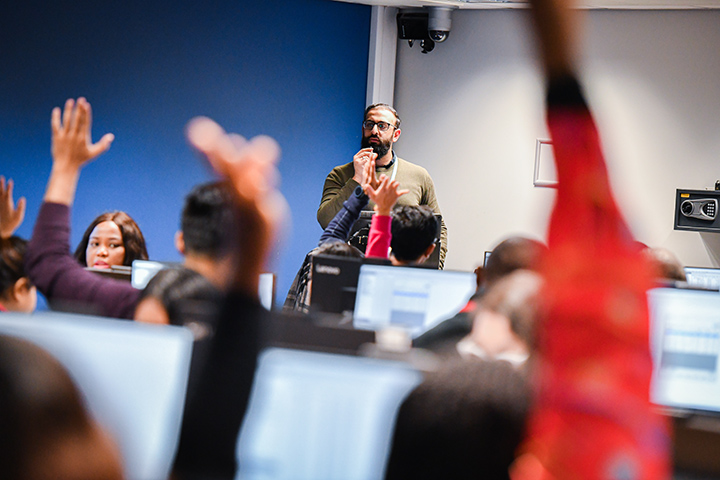
Navigating the transition to university
Bradford Life
Hamza studies Business and Management at Bradford and tells us what to expect from the transition to university along with some tips on how to manage this.
Hello there! My name is Hamza Nadeem, and I'm studying Business and Management at University of Bradford. As an enthusiastic learner and a passionate supporter for education, I'm excited to share my experience and insights with you.
Whether you're a prospective university student or someone seeking guidance on academic success, I'm here to assist you on your journey. Boarding the journey to university is an exciting and transformative experience. However, the transition can also be overwhelming, particularly when it comes to the intensified workload and expectancies.
Nevertheless, do not worry as this blog post aims to provide you with precious insights and practical tips to help you prepare for the academic challenges that lie ahead. Through applying effective structural strategies and using your summer break intelligently, you can set yourself up for success from day one.
Understanding the step up in workload
University courses are commonly more demanding and challenging compared to college and high school. You might expect an elevated volume of reading materials, complex assignments, and independent study obligations. Lectures normally cover a broader range of topics, and you'll need to engage in critical thinking and analysis which is more thorough than what you are used to.
Preparing over the summer
Take time out in the summer to familiarise yourself with the course outlines and syllabus for the upcoming semester. Take note of important deadlines, required readings, and assignments. This will help you understand the expectations and plan your workload in advance.
Identify the main modules you'll be studying and use the summer holidays to refresh your knowledge in those areas. Read relevant books, watch educational videos, or explore online resources related to your chosen field of study. This practical approach will give you a head start and build confidence, from my personal experience.
University underlines critical thinking, research, and effective communication. Practice these skills by analysing articles, writing different length essays, and solving problems related to your field of study.
Organisation tips
Develop a weekly study schedule that aligns with your course timetable and allows adequate time for assignments, reading, and revision. Be realistic about your capabilities and avoid cramming.
Use a planner or digital calendar to keep track of important dates, deadlines, and commitments. Set reminders for assignment due dates, exams, and other events. Digital tools like Apple Calendar or task management applications on your mobile device can help you stay organised.

When faced with a large task or assignment, break it down into smaller, more convenient tasks. This approach makes it easier to follow progress and reduces the feeling of being overwhelmed. Creating a to-do list with specific action items for each task and prioritising them based on deadlines and importance will make you feel relaxed and more capable of completing each task more calmly.
Effective to-do lists
Begin each day or week by labelling the most important tasks that need immediate concentration. Focus on completing high-priority elements first, as this will help you stay on track and control your workload successfully.

Be attentive of your capabilities and set realistic goals for each day or week. Avoid overpowering yourself with an excessive number of tasks. As an alternative, aim for a convenient workload that allows you to preserve quality and focus.
Take time to review and update your to-do lists regularly. As new tasks arise or priorities shift, adjust your list accordingly. Regularly assessing and reevaluating your tasks will help you stay organised and avoid missing deadlines.
Embrace the opportunities
As you prepare to step into the world of university education, remember that the transition may feel overwhelming at times, but with perseverance and proper planning, you can overcome any difficulty.
Embrace the opportunity to develop critical skills, expand your knowledge, and build lasting connections. Stay focused, be kind to yourself, and remember that success is not solely defined by grades, it's also about personal growth and the joy of learning.
Cherish each moment of your university journey, and use this time to discover your passion, embrace challenges, and pave the way for a bright and fulfilling future.
Best of luck and may your university adventure be nothing short of exceptional.
